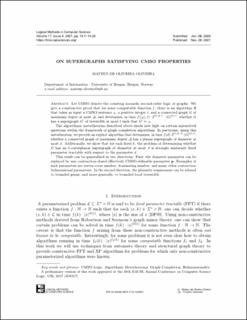| dc.contributor.author | Oliveira, Mateus De Oliveira | |
| dc.date.accessioned | 2022-04-26T07:07:05Z | |
| dc.date.available | 2022-04-26T07:07:05Z | |
| dc.date.created | 2022-02-14T01:40:41Z | |
| dc.date.issued | 2021 | |
| dc.identifier.issn | 1860-5974 | |
| dc.identifier.uri | https://hdl.handle.net/11250/2992661 | |
| dc.description.abstract | Let CMSO denote the counting monadic second order logic of graphs. We give a constructive proof that for some computable function f, there is an algorithm A that takes as input a CMSO sentence φ, a positive integer t, and a connected graph G of maximum degree at most Δ, and determines, in time f(|φ|,t)⋅2O(Δ⋅t)⋅|G|O(t), whether G has a supergraph G′ of treewidth at most t such that G′⊨φ. The algorithmic metatheorem described above sheds new light on certain unresolved questions within the framework of graph completion algorithms. In particular, using this metatheorem, we provide an explicit algorithm that determines, in time f(d)⋅2O(Δ⋅d)⋅|G|O(d), whether a connected graph of maximum degree Δ has a planar supergraph of diameter at most d. Additionally, we show that for each fixed k, the problem of determining whether G has an k-outerplanar supergraph of diameter at most d is strongly uniformly fixed parameter tractable with respect to the parameter d. This result can be generalized in two directions. First, the diameter parameter can be replaced by any contraction-closed effectively CMSO-definable parameter p. Examples of such parameters are vertex-cover number, dominating number, and many other contraction-bidimensional parameters. In the second direction, the planarity requirement can be relaxed to bounded genus, and more generally, to bounded local treewidth. | en_US |
| dc.language.iso | eng | en_US |
| dc.publisher | Logical Methods in Computer Science | en_US |
| dc.rights | Navngivelse 4.0 Internasjonal | * |
| dc.rights.uri | http://creativecommons.org/licenses/by/4.0/deed.no | * |
| dc.title | On Supergraphs Satisfying CMSO Properties | en_US |
| dc.type | Journal article | en_US |
| dc.type | Peer reviewed | en_US |
| dc.description.version | publishedVersion | en_US |
| dc.rights.holder | Copyright 2021 the author | en_US |
| cristin.ispublished | true | |
| cristin.fulltext | original | |
| cristin.qualitycode | 1 | |
| dc.identifier.doi | 10.46298/LMCS-17(4:14)2021 | |
| dc.identifier.cristin | 2001118 | |
| dc.source.journal | Logical Methods in Computer Science | en_US |
| dc.source.pagenumber | 14:1-14:22 | en_US |
| dc.identifier.citation | Logical Methods in Computer Science. 2021, 17 (4), 14:1-14:22. | en_US |
| dc.source.volume | 17 | en_US |
| dc.source.issue | 4 | en_US |

